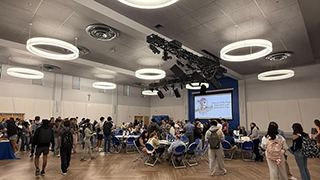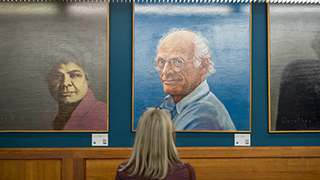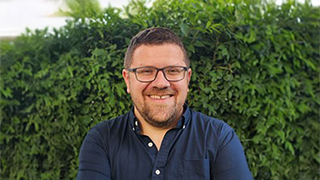Seton Hall University Hosts Dynamic BAASANA Conference on AI and Society
Tuesday, September 16, 2025
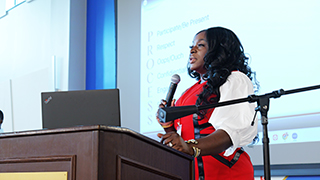
Keynote speaker Issata Oluwadare addressing conference attendees
Over the summer, Seton Hall University welcomed global scholars, executives and students for the 2025 International Conference of the Business and Applied Sciences Academy of North America (BAASANA), positioning the university and its Division of Continuing Education and Professional Studies (CEPS) as leaders in convening high-level thought leadership events.
The two-day conference, themed "AI and Society: Navigating the Future of Technology and Human Well-Being," brought together voices from across academia, business and technology to examine the promise and challenges of artificial intelligence. From addressing ethical concerns to exploring the role of AI in education, leadership and health, the conference underscored Seton Hall’s role as a hub for innovation, dialogue and collaboration.
Jet Mboga, BAASANA president, opened the event by honoring the Academy’s founders and longtime members before framing the conference’s urgency. “This theme could not be timelier,” she noted. “As AI continues to transform industries and redefine relationships, it is imperative that we critically examine its impact on human well-being and societal structures. This gathering embodies BAASANA’s mission to bring innovation, intellectual curiosity and social responsibility into focus.”
Conference highlights included an opening address from Berkeley College president Diane Recinos on “Remembering the Human Side in an AI World,” followed by a student-led panel on envisioning AI’s impact in higher education. The panel was moderated by John H. Shannon of Seton Hall’s Stillman School of Business and featured Kathleen Meager ’25, Kyle Ganning ’25 and Nicole Voltmer ’26, who shared their research findings from their intensive project Charting the Future of Higher Education, which they have presented to the university board and other audiences over the past year.
Keynote speaker and Rutgers faculty member Issata Oluwadare explored Generation Z’s social and workplace challenges in "Teaching Soft Skills to America’s Loneliest Generation," providing deep insight along with one of her students on how high-impact teaching practices and empathy can engage Gen Z in ways that acknowledge the digital world they grew up in, while fostering their talents, confidence and leadership development.
Breakout sessions delved into pressing questions on AI’s role in finance, healthcare, marketing, leadership and education, with faculty and students from institutions across the U.S. and abroad contributing research and perspectives. The breadth of presentations, from deepfakes and social engineering to AI in human resource management and sustainability, demonstrated the interdisciplinary reach of the conference.
Donald Crooks, BAASANA past president and professor emeritus of Wagner College, emphasized the collaborative spirit at the heart of the event: “At BAASANA, we believe the intersection of knowledge, innovation and community is where breakthroughs happen. This conference was a testament to the power of collective expertise. The conversations here will ripple outward, shaping how AI can be harnessed responsibly for the betterment of society.”
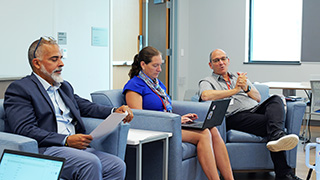
Co-authors of the 2025 24-hour Hackathon research paper ready to present their findings at the conference
Seton Hall played a key role not only as host but also as an active participant. Mary Kate Naatus presented on AI’s potential to reshape global academic partnerships, noting: “Hosting this conference with a strong student presence shows our commitment to being a place where ideas are exchanged openly, where different perspectives come together, and where those conversations spark innovation that reaches across industries and borders.”
In addition, the conference featured Best Presentation Awards, with standout recognition for Kendra Sherman, Seton Hall’s assistant director of residence life and doctoral student in higher education leadership, for her research on international education and AI. A paper emerging from the 2025 24-hour Hackathon, co-authored by Sandro Tejada, Mark Schild, Manfred Minimair, Victor Lopez and Naatus, was also recognized, highlighting Hackathons as catalysts for building a co-curricular culture of AI, cyber and innovation. Reflecting on the initiative, Tejada shared, “This Hackathon is such an impactful strategic initiative. It creates a space where students, faculty and industry leaders can co-create solutions to real-world challenges while advancing research that has immediate relevance.” Seton Hall will host its second annual 24-Hour Hackathon on March 21 and 22, 2026 (more information available here).
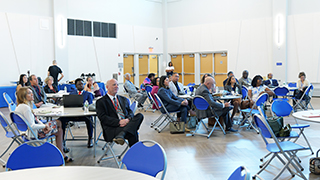
Focused and Present: In-person Attendees at the 2025 BAASANA Conference
The conference was further shaped by the leadership of Margaret Laryea, a Stillman master’s student in business analytics, who served as project manager and volunteer coordinator for the event and noted, “This was a great venue for students to present their work, gain feedback and build their professional networks.” Other Seton Hall student presenters, including Janice Huang, demonstrated the university’s diverse and growing talent, while international participants from Bangladesh and Nepal, including Jahirul Haque, vice chancellor of the Canadian University of Bangladesh, helped expand the dialogue around innovation and leadership around the globe.
Closing remarks from Wagner College president Jeffrey A. Doggett highlighted the need for higher education institutions to address the reality of AI as it impacts the future of work. Universities must prepare students to navigate within that evolving landscape, understanding the technology, the benefits, the risks and to develop the ethical and moral compass necessary to lead responsibly in an AI-driven world.
For inquiries on events and professional programming, as well as professional development opportunities in AI, leadership and technology at Seton Hall, visit our division website or contact ceps@shu.edu.
Categories: Arts and Culture, Education, Nation and World


